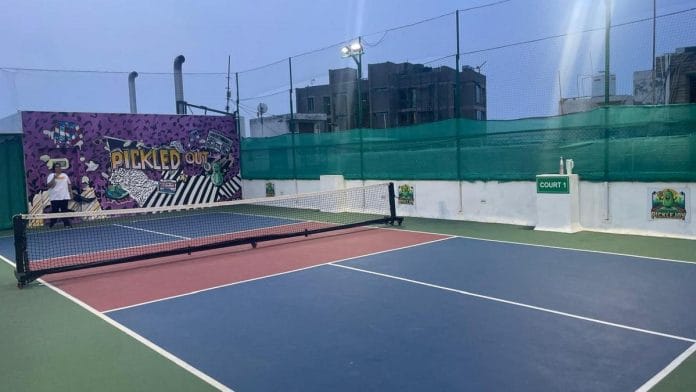New Delhi: Open plots in Mehrauli usually end up as farmhouses or vegetable fields. But across the metro station, one such barren patch now hosts six sleek pickleball courts. It’s part of a growing rush in Delhi to invest in arenas for the latest urban sporting obsession.
Since launching last December, the thwack of paddles has been echoing late into the night at Rackonnect Exclusive Padel Pickle Park (REPPP). Complete with a cafe and Pro Shop, the venue operates from 6 am to 3 am, shutting for just three hours a day.
“Delhi’s growing demand for pickleball was obvious, given the pace at which new courts were popping up,” said REPPP’s 28-year-old founder Dhruv Bagla, who runs a racquet sports community and primarily develops badminton facilities. “It made sense to invest before the market gets saturated.”
Delhi now has pickleball courts in unused farmlands, backyards, residential clubs, school campuses, and even rooftops. For entrepreneurs, it’s relatively inexpensive to set up and offers a relatively quick return on investment (ROI). With per hour court rentals ranging from about Rs 600 to 1,000, operators say monthly profits can easily reach Rs 5 lakh, if not more.
There’s plenty of privately owned land in Delhi-NCR, and the growing pickleball craze has given owners a productive way to put it to use. We had 2 acres of land lying empty. Had no plans for it. So I converted it into a pickleball space
-Armaan Varma, founder of Ardee Racquet Club
After its massive pandemic-era boom in the US, pickleball—a cross between tennis, ping pong, and badminton—is becoming the spice of life in Indian cities. From a handful of courts a few years ago, the country now has over 1,200, with new ones being added constantly. Around 60,000 players are currently registered, a number expected to hit 1 million by 2028, according to a report by Bonafide Research. From a nightlife craze in early-adopter Ahmedabad to a championship in Mumbai with a Rs 1 crore prize pool, the sport has quickly scaled. It’s even made it to Shark Tank, with Mumbai’s Goodland securing Rs 80 lakh earlier this year.
In Delhi, what Zumba and yoga studios were a decade ago, pickleball is now. Young adults and corporate professionals dominate the courts, often using evening games as a way to let off steam and catch up on office gossip or college news.
“Delhi-NCR has nearly 150 pickleball venues, yet the demand continues to outpace supply,” said Sammir Kapoor, director, Rebound Ace India, which manufactures and supplies sports flooring.
Kapoor, who has been in the business for over a decade, says he now gets at least three calls a day from people wanting to build pickleball venues or convert existing badminton, tennis, or basketball courts.
“Pickleball in India is driven by entrepreneurs who see it as a great investment opportunity and have a soft spot for sports,” said Kapoor.
The current growth curve shows no signs of slowing, with at least 20 pickleball court projects in the pipeline across Delhi-NCR, according to Sammir Kapoor.
Also Read: Pickleball is Ahmedabad’s newest addiction. And it’s reshaping the city’s nightlife
Rooftops, schools, converted courts
High above the clamour of Lajpat Nagar, under open skies, a paddle slaps a ball across a graffiti-tagged court. Perched on top of a commercial building that houses startups like Sleepy Owl and Avian, PickleJoy promises just a little extra thrill.
“The vibe here is just better than most places we’ve played at,” said 21-year-old Delhi University student Akshara. “The graffiti—like ‘Pickled Out’ and ‘In a Pickle’—adds such a fun, vibrant touch. It feels cool.”
He and his friend Madhav, also 21, discovered the rooftop court while they were looking for a place to play closer to their Lajpat Nagar homes. Before that, they’d travel all the way to Bal Bharati Public School–Pitampura to play.
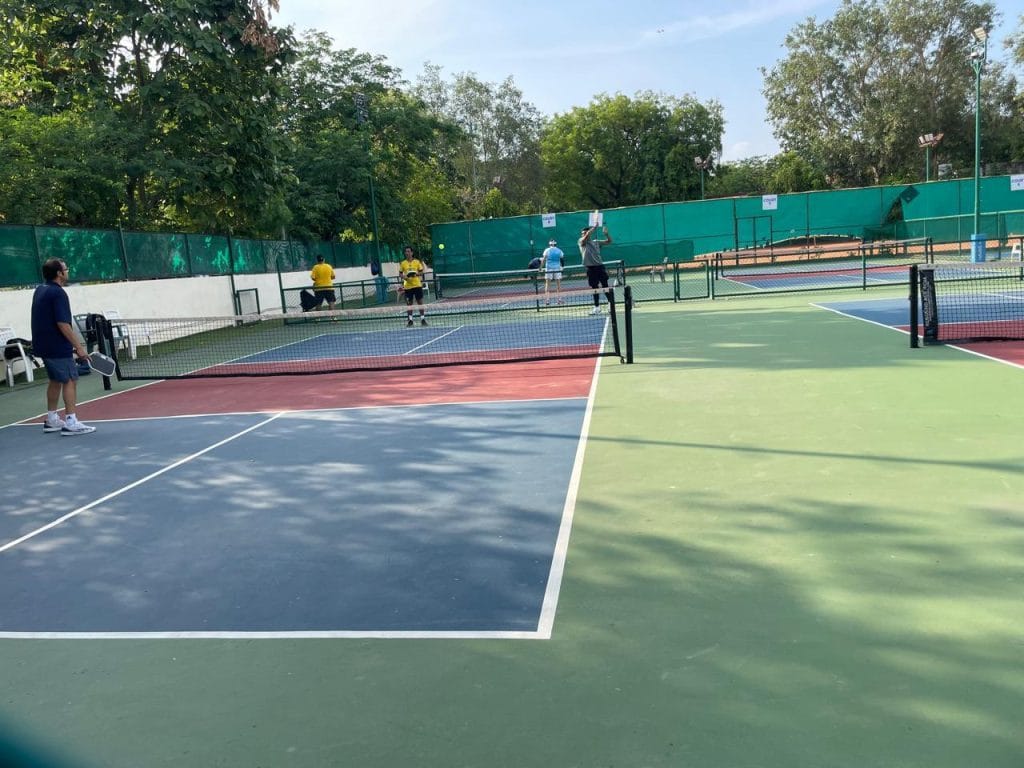
Launched in January, PickleJoy has two full-size courts, a seating area, and washroom and shower facilities. The rooftop setup includes multiple protective layers: a metal grill followed by two braided nets to keep balls from falling off the edge. Initially, Akshara and Madhav had safety concerns, but those worries faded after their first visit. Now, it’s part of their daily schedule.
While the game can be an expensive hobby—standard hourly court charges are around Rs 1,100—most players here have monthly memberships. Equipment can be rented on site for Rs 50 an hour, or players bring their own.
“Playing under the open sky, with a million-dollar view in the middle of the city, especially in the evening, makes the experience feel totally unique,” Akshara said. “It’s unlike the ground-level and standard indoor courts.”
While there’s at least one more rooftop court in Delhi—Pick It Up in Kirti Nagar—the concept is still a novelty. It was this that entrepreneur Pranav Kapur, who named the court after his six-year-old daughter Joya, wanted to capitalise on.
It’s become a community space. You come for the game, but you stay for the vibe. There’s music, the café, people. It’s almost like therapy after work
– Divya Mehta, a regular at REPPP
“There are already great ground-level courts in NCR, so we wanted to build something fresh and different,” said Kapur, who rents the space. Evening hours, from 6pm to midnight, are the busiest.
But setting up a rooftop court came with its own set of challenges from testing materials to refining the playing surface based on player feedback to ensuring iron-tight security.
“We shut down one court just two months after opening to fix a minor bounce issue. Anything less than a 10/10 isn’t good enough.”
If Kapur targeted an empty rooftop, real estate businessman Armaan Varma turned under-utilised land into a parallel income stream. The 26-year-old turned unused land at his family’s school, The Ardee School in New Friends Colony, into four pickleball courts called Ardee Racquet Club. On Instagram, the venue plays up the competitive spirit with sundowner events and memes like “You don’t practice pickleball to be good. You practice to be better than that one friend.”
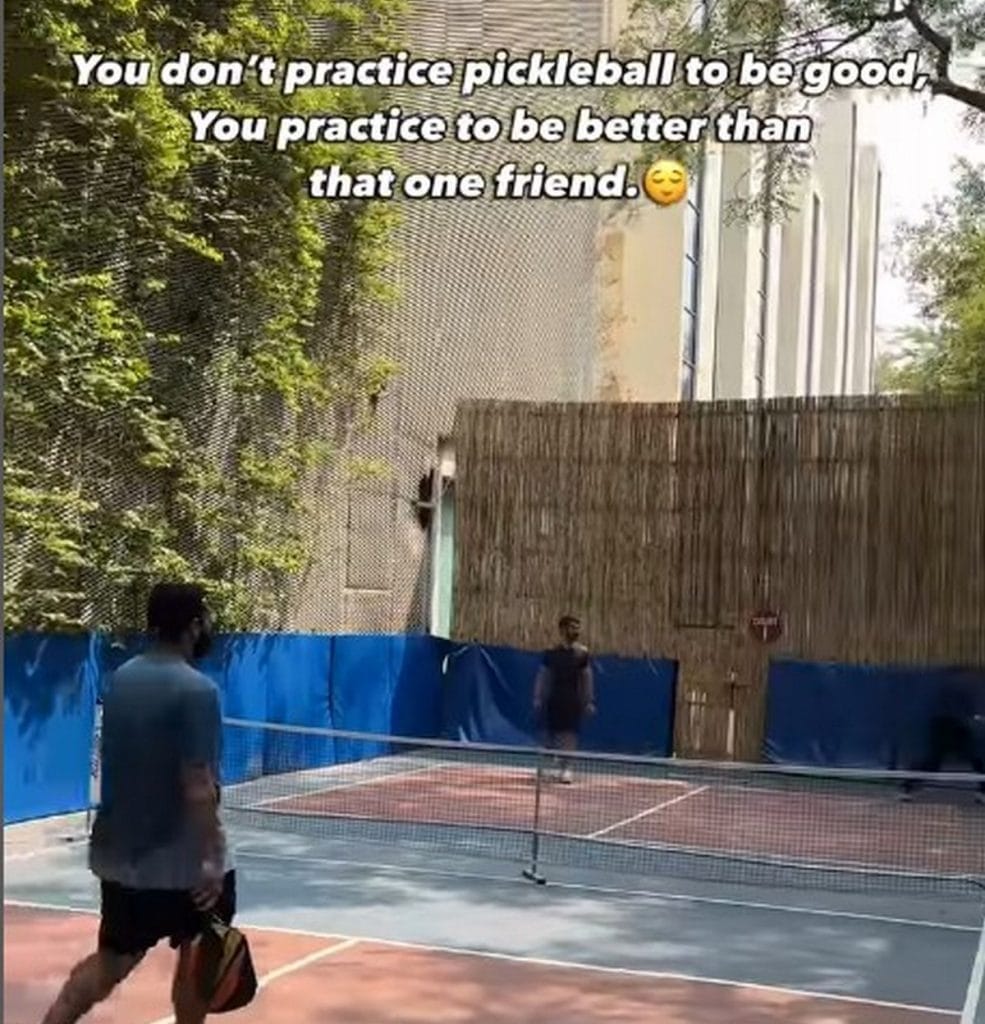
“There’s plenty of privately owned land in Delhi-NCR, and the growing pickleball craze has given owners a productive way to put it to use,” he said. “We had 2 acres of land lying empty. Had no plans for it. So I converted it into a pickleball space.”
From day one, he was flooded with bookings for slots from 4 pm to midnight.
“I saw the potential and the possibilities within a month,” said Varma, who also has a pickleball court in the backyard of his house.
Without wasting any time, he built seven pickleball courts in Sector 52 of Gurugram this year.
Varma has been managing both locations for the past six months. In New Friends Colony, which has four courts, he handles around 450 bookings a month—an average of 15 a day. His Gurugram venue gets 300 to 400 bookings each month.
It’s not always necessary to start from scratch. Many badminton and tennis courts across Delhi-NCR are being repurposed as pickleball hubs. Several elite clubs—such as Vasant Vihar Club, Palms Town & Country Club, and DLF City Club—have converted existing courts to offer a more exclusive and curated playing experience.
“We get the maximum demand of converting existing courts into pickleball ones from schools and society clubs,” Sammir Kapoor said. “Easily we have converted 60 courts in Delhi NCR alone.”
Location, according to Bagla, can make or break a centre. Accessible neighbourhoods with high footfall and an urban, active demographic—like South Delhi’s Vasant Vihar or Gurgaon’s Golf Course-adjacent zones—are considered prime.
Also Read: Strike that—how carrom became India’s favourite game at home
A profitable play
At Mehrauli’s REPPP, a typical day for founder Dhruv Bagla begins early and stretches late into the evening. He juggles multiple roles—managing court bookings, supervising attendants and café staff, and constantly troubleshooting on-ground logistics. His core team includes coaches, several attendants, and a café crew that keeps the social energy going between matches.
Players start trickling in by late afternoon, but peak playtime is between 6 and 10 pm. Weekends are packed, sometimes with waitlists.
“We’ve seen an average of six to seven hours of court bookings daily,” Bagla said. But that’s not the case everywhere, he added.
“It’s still a hit-and-try model. Not every pickleball venture takes off. A lot depends on footfall and how well you manage things. Some courts shut down because they were either too remote or lacked a proper setup,” he said.
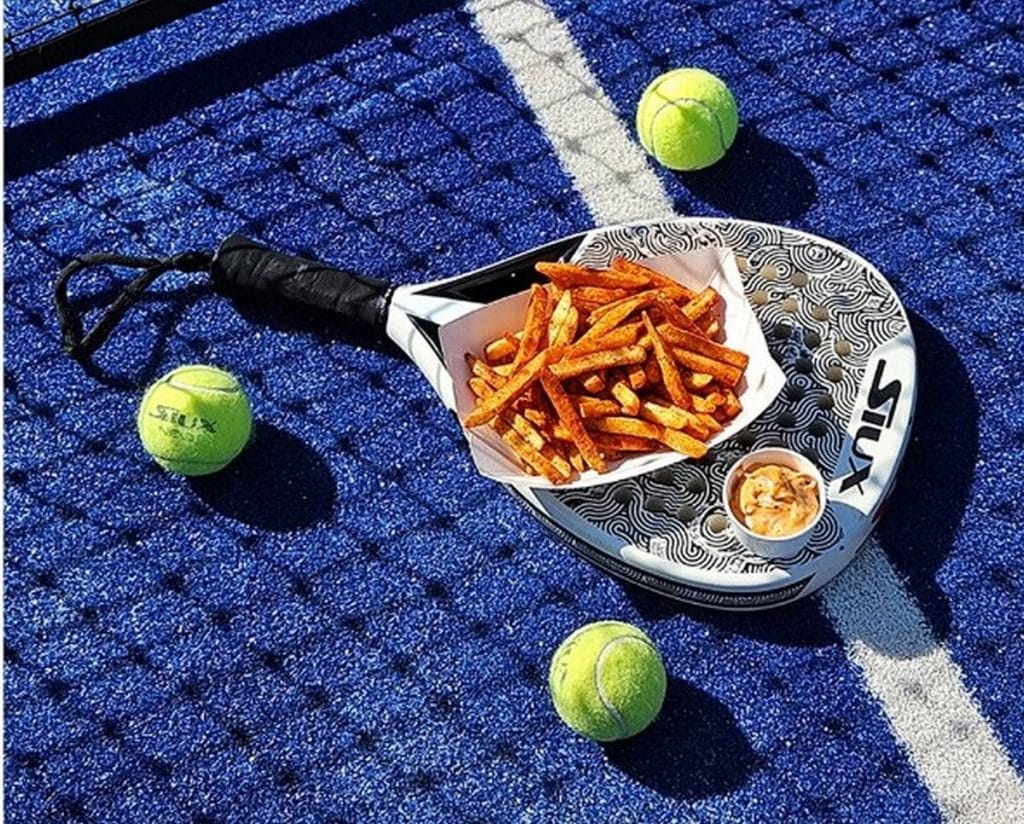
Location, according to Bagla, can make or break a centre. Accessible neighbourhoods with high footfall and an urban, active demographic—like South Delhi’s Vasant Vihar or Gurgaon’s Golf Course-adjacent zones—are considered prime. Extras like a café also add to the appeal.
For many regulars, REPPP isn’t just about pickleball. “It’s become a community space,” says Divya Mehta, a 32-year-old marketing executive who plays here four times a week. “You come for the game, but you stay for the vibe. There’s music, the café, people. It’s almost like therapy after work.”
While operators like Bagla and Varma report higher average bookings, a more conservative estimate across venues is about five hours daily. Even so, few recreational ventures offer as quick or reliable a path to profit as pickleball. Between low overheads, robust demand, and high repeat usage, breaking even and turning a profit takes mere months rather than years.
Setting up a minimum of four pickleball courts—the typical number needed to run a viable facility—costs around Rs 24 lakh, with slight variations depending on the quality of materials used, according to Kapoor.
“With an average per hour rate of Rs 1,000 per court and operations running seven days a week, that translates to a monthly revenue of Rs 6 lakh,” Kapoor said.
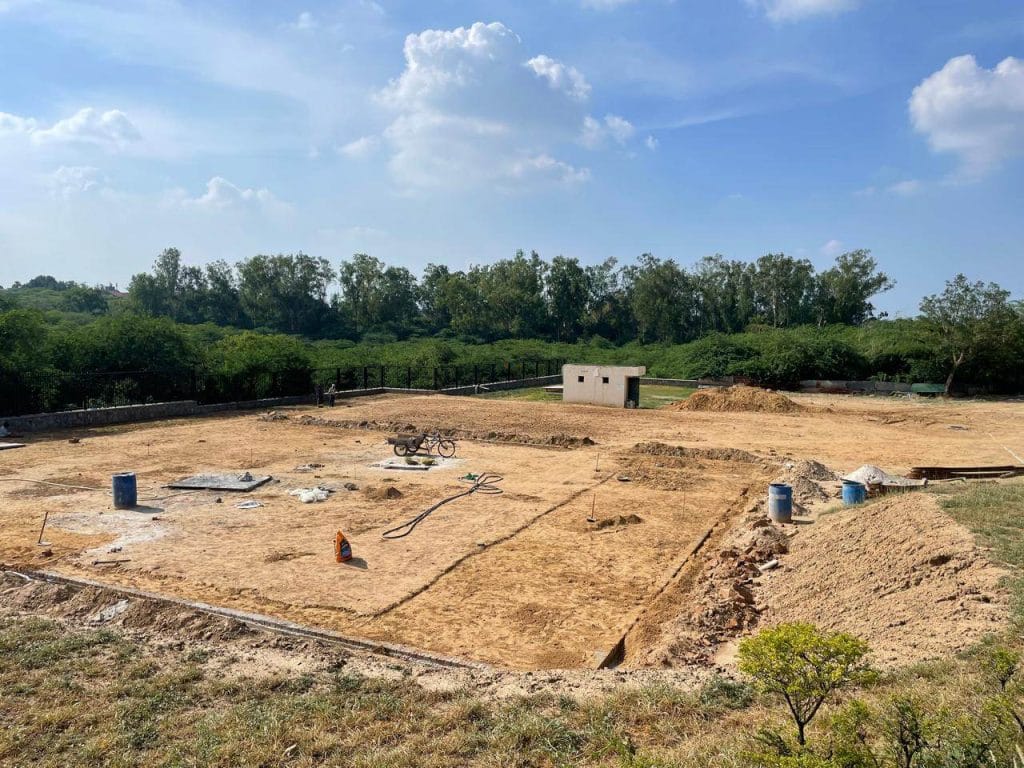
Since many of these courts are built on privately owned land, rent is usually nil and operational costs remain low. On average, he added, owners spend around Rs 1 lakh per month on maintenance and social media marketing.
“That leaves a monthly profit of about Rs 5 lakh, meaning break-even is achievable within six months—therefore more entrepreneurs are entering the pickleball space.”
Converting existing badminton or tennis courts into pickleball courts is an even more cost-effective option, typically requiring a budget of Rs 5–6 lakh, allowing owners to recover their investment in just about a month.
The current growth curve in Delhi-NCR shows no signs of slowing, according to Kapoor, the bulk of whose business is now coming from pickleball.
“There are at least 20 pickleball court projects in the pipeline across Delhi-NCR,” he said.
Now, even residential societies are getting in on the action. In EROS Lakewood City, a residential complex in Surajkund, initial plans for a multi-sport arena included tennis, badminton, and other activities. But with the growing popularity of pickleball, the owners decided to include four pickleball courts.
Kapoor, who is working on the project, said it will be ready in two to three months.
“The market is far from saturated. For at least the next year, pickleball remains a relatively low-risk, high-return business,” he said, surveying the construction site in Surajkund.
(Edited by Asavari Singh)



